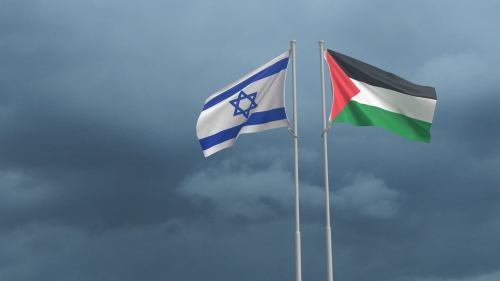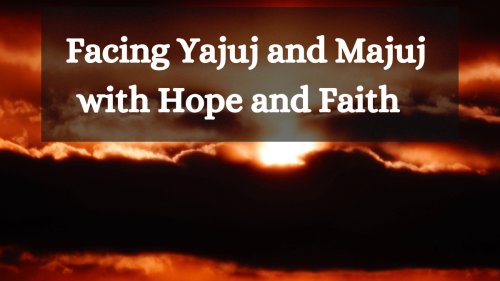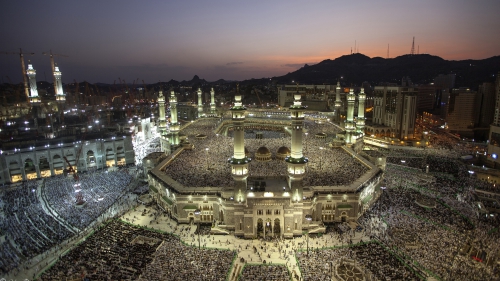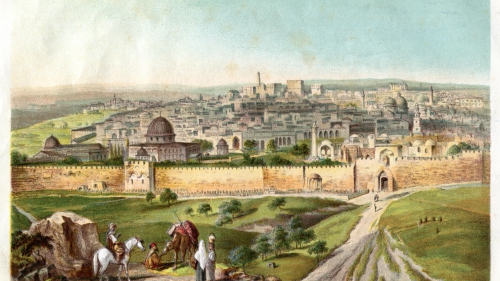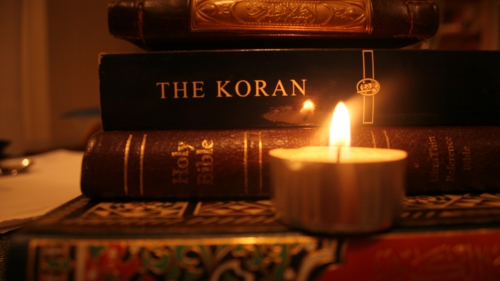Choosing to be chosen: Divine Relationships with multiple religious communities.

A major misunderstanding of the Biblical concept of God choosing a people or a prophet is caused by the use of the word 'the' chosen when a better translation would be 'a' chosen prophet or people. Relationships are always unique and exclusive, but just as a parent can and should have a loving relationship with several different children; God can and does have unique and exclusive relationships with many different prophets and many different religious communities.
As a well known Hadith says: "Prophets are paternal brothers (sons of one father by co-wives). Their mothers (mother tongue, motherland etc.) are different but their religion (from the one and only God) is one." (Bukhari Vol. 4: Book 55 #651 and Muslim Book 30: #5834-6).
According to the Bible the relationship between God and Israel is similar to a marital partnership, as can be seen from the following Biblical verses:
1. God proposes a marriage covenant at Sinai:
God said to Moses "Speak thus to the house of Jacob, and tell this to the children of Israel… Now if you listen to me and keep my covenant, then you will be my special possession out of all the peoples, for the whole earth is mine. You will be my kingdom of priests, my holy nation. These words you shall speak to the people of Israel" (this is the proposal)
"Moses came and summoned the elders of the people and set before them all these proposals as God had commanded him. All the people answered together, 'All that God has proposed, we will do.' (like "I do" at a wedding). Moses brought this answer back to the Lord." (Exodus 19:5-8).
2. Why the Jews? Because God loved their ancestors.
"The Lord cared for your ancestors loving them and chose their descendants after them from all nations, as you are this day." (Deuteronomy 10:15)
"I will fulfill my covenant between myself and you (Abraham) and your descendants after you, generation after generation, an everlasting covenant, to be your God, yours and your descendants after you." (Genesis 17:7)"
“All the families of the earth shall be blessed through you (Jacob) and your descendants." (Genesis 28:14)
3. Why the Jews? Divine love isn’t based on popularity or large numbers.
"It was not because you were more numerous than any other nation that the Lord cared about you and chose you, for you are the smallest of nations; it was because of the Lord’s love for you, and his oath to your ancestors." (Deuteronomy 7:7-8)
4. Is being chosen and special make you better? No.
A committed loving relationship results in more giving (Mitsvot), more receiving (Torah, Prophets and sages) and more grief (because each cares about the other). "For you alone have I cared among all the nations of the world, therefore I will castigate you for all your iniquities." (Amos 3:2)
5. Israel can’t adore any other God, but God can and does redeem other nations.
"Are not Israelites like Ethiopians to me? Says the Lord. Did I not bring Israel up from Egypt, the Philistines from Crete and the Aramaeans from Kir?" (Amos 9:7)
6. Jews are not THE chosen people; they are A chosen people, the first of several monotheistic religions.
A parent can have many children but only one is the firstborn. "These are the words of the Lord, Israel is my first-born son." (Exodus 4:22) The Jewish people was the first community to enter into a sacred relationship with the one God but they are not the only ones to do so. In later centuries other communities were formed that Jews see as our younger siblings.
That process will continue until all nations have a sacred relationship to the one God of Israel. "Each nation will walk in the name of its God, and we will walk in the name of the Lord our God for ever and ever." (Micah 4:5) Even in the Messianic Age the other nations will be free to faithfully follow their vision of God.
7. What is Israel chosen for? To be an agent of holiness and enlightenment.
"You are the children of the Lord your God…You are a people holy to the Lord your God." (Leviticus 19).
"The Lord has chosen you out of all the nations on earth to be his special possession." (Deuteronomy 14:1-2)
"I will make you a light for the nations" (Isaiah 49:6)
So other nations will also be blessed through their own religions that were sparked by Israel’s covenant with God at Sinai, thus fulfilling the promise to be a blessing to all the nations of the earth.
As a Rabbi, I believe that the many prophets Allah/God sends to the Children of Israel is a sign of the ongoing covenant between Allah and the Children of Israel. I know Muslim interpreters interpret Qur'an 2:63-64 to mean that the favors mentioned in those verses were conditional with a certain period of time when the Divine trust—the representation and promotion of God’s eternal religion—rested on the shoulders of the Children of Israel.
The biblical religious tradition claims this trust is an "ongoing covenant" between God and the Children of Israel. Clearly, not all Jews live up to this trust, but God's commitment is ongoing for the whole community of those who do.
Although many Christians claim the new covenant replaces the old covenant for all Jews, and some Muslims say the Jewish covenant has expired for all Jews, faithful Jews remain loyal to their spiritual relationship with God. I believe wisdom dictates that we follow the Qur'an's (22:67) advice: "For every community We have appointed a whole system of worship which they are to observe. So do not let them draw you into disputes concerning this matter."
The Qur’an relates God's ongoing concern for faithful Jews when Prophet Moses speaks to his people as follows: "O my people! Remember God’s favor upon you, for He appointed among you Prophets, and rulers, and He granted to you favors such as He had not granted to anyone else in the worlds" (Qur'an 5:20).
This is one reason why Jews in Sunni Muslim lands have rarely been forcibly converted; as frequently happened in Christian lands.
The principle that God can make a covenant with a whole people, and not just with those who are faithful believers, also helps me understand a powerful verse where the Qur'an narrates that at Sinai, before Allah gives the Torah to the Children of Israel, He makes a covenant with them. Allah raises the mountain above the whole people saying: "Hold firmly to what We have given you (the Torah) and remember what is in it" (Qur'an 2:63).
The whole nation's fate stands under the shadow of mount Sinai, and this explains the miracle of all Israel agreeing to the covenant. This may be the reason why Moses/Musa is the only prophet whose book comes not from an angel but directly from Allah. Individuals who hear a prophet may choose to believe or disbelieve, but in this case God Almighty makes "an offer that you can't refuse," so, as far as Judaism is concerned, everyone of the Children of Israel has to struggle for all generations to come, with living up to the covenant their ancestors chose to enter into at Mount Sinai.
This concept, of a chosen (by being pressed into being a) choosing people, can and among many ultra-orthodox Jews has, lead to exaggerated and self-righteous feelings of pride. Thus, when the Qur'an (7:171) mentions another time the same event, when the Mount was moved above the Children of Israel, this verse is followed by a reminder in 7:172 that "children of Adam" were all made bear witness against their own souls:
"‘Am I not your Lord?’ They said ‘Yes, we do bear witness." God Almighty made a covenant with all individuals "lest [they] should say on the Day of Resurrection, ‘We were indeed unaware of this'."
Thus, while loyalty to the commitment one's ancestors made at Mount Sinai may inspire greater effort for Jews in following God's will, when Jews, like Muslims, Christians and everyone else on earth face judgement on the Day of Resurrection, we are all judged as individuals. As Prophet Abraham says:
"Do not forsake me on the Day of Resurrection, a day where neither money nor children will benefit except whoever meets Allah with a sound heart" (Qur'an 26:87-89). This reminder by the Qur'an that no religious community should be self-righteous is similar to that of prophet Amos who tells the Children of Israel:
"Are you not like the Children of Ethiopia to me, O Children of Israel? says God. Did I not redeem Israel from Egypt, and the Philistines from Caphtor, and the Syrians from Kir?" (Amos 9:7)
I myself see the Torah's description of the descendants of Prophet Abraham as destined to become the first chosen people, as a testimony about the significance of Prophet Abraham himself. Islamic tradition asserts that there have been tens of thousands of prophets who were sent to all the various tribes and nations of the world. Messengers however, number only 300.
Of the 300, we only know the names of five who brought a sacred scripture. The first one of the five is Abraham as the Qur'an states: "Indeed, this is in the former scriptures; the scriptures of Abraham and Moses." (Qur'an 87:19), and: "Or has he not been informed of what was in the scriptures of Moses and Abraham." (Qur'an 53:36).
For very many centuries Abraham's faithful descendants within the Children of Israel were the only monotheistic community that survived. Jews could have credited this situation to their own spiritual qualities. But the Torah teaches Jews not to be proud of themselves for being the first monotheistic community to survive long after their messenger was gone; because it was God's choice to choose them.
Their only choice was to always be conscious of, and obligated by, God's choice; to remain loyal to their ancestors pledge at Mount Sinai: "We will do."
Notes:
A hadith is one in a collection of sayings and descriptions of activities by prophet Muhammed.
Mitzvah (a.k.a. mitsvah): A good or praiseworthy deed.
This is the concept of supersessionism, a.k.a. replacement theology or fulfillment theology. Many early Christian believed that the Christian Church succeeded the Israelites as "the" chosen people of God. This was a common belief in the Church until the Nazi Holocaust, which triggered theological thought after World War II. The Roman Catholic Church largely abandoned the concept starting in the mid-1970''s. The Presbyterian Church (U.S.A.), United Church of Christ, and Episcopal Church (USA) followed in the 1980's. Some denominations still retain the belief.








